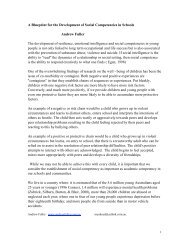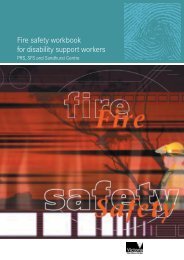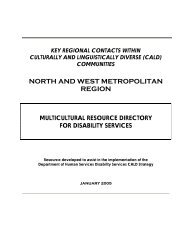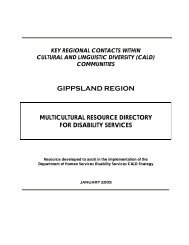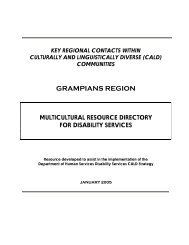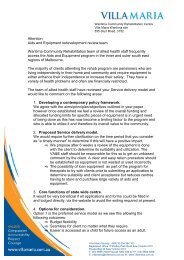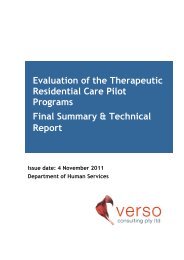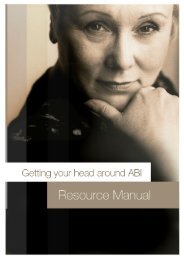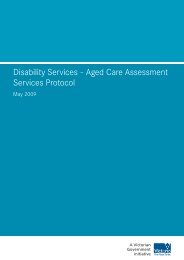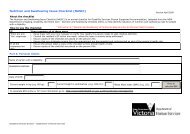Positive Behaviour Support - Department of Human Services - Vic ...
Positive Behaviour Support - Department of Human Services - Vic ...
Positive Behaviour Support - Department of Human Services - Vic ...
Create successful ePaper yourself
Turn your PDF publications into a flip-book with our unique Google optimized e-Paper software.
PowerPoint 79*<br />
<strong>Positive</strong> behaviour support: Getting it right from the start - Facilitators reference manual 57<br />
Mistaken and alternative interpretations <strong>of</strong> behaviour 18<br />
Common misinterpretations Examples <strong>of</strong> Alternative interpretation<br />
Attention seeking<br />
For example: people follow staff or<br />
family members around the house,<br />
touch others inappropriately, attempt to<br />
pass objects at seemingly inappropriate<br />
times; tease others; interrupt others<br />
or act in a way that is found to be<br />
‘annoying’.<br />
Self-stimulating<br />
For example: people rock, twist or play<br />
with their fingers and toes; slap their<br />
face or their legs persistently; twirl<br />
around; poke at their eyes; hum or sing<br />
inappropriately.<br />
Self-injuring<br />
People pick at their skin, cut themselves<br />
with sharp objects, place objects in<br />
their body cavities, pull their hair out, eat<br />
or drink to excess.<br />
Non-compliant<br />
People do not do things as they are<br />
asked to do them, when they are asked,<br />
or do not finish things they start.<br />
Disruptive<br />
People talk or make noises at<br />
inappropriate times, yell, interfere with<br />
the work or activities <strong>of</strong> others or break<br />
things.<br />
Aggressive<br />
People throw objects or hit out at<br />
others.<br />
Initiating relationships –they want friends<br />
Seeking company –they are lonely<br />
Seeking reassurance – they are scared<br />
Seeking help or support –they lack skills or confidence<br />
Personality issues<br />
Bored, overwhelmed or over stimulated and may need to calm<br />
Unable to identify or initiate an alternate activity<br />
Syndrome specific behaviours, possibly related to neurological<br />
problems<br />
Health and medical needs<br />
Nervous<br />
Anxious<br />
Depressed<br />
Psychiatric issues<br />
Bored/Boredom<br />
Not interested<br />
Not understanding<br />
Not being asked the right way<br />
Not having sufficient skills<br />
Not having sufficient stamina (tired)<br />
Recalling bad memories <strong>of</strong> a past experience<br />
Frightened<br />
Scared<br />
Stressed<br />
Lacking understanding <strong>of</strong> the situation<br />
Not knowing what is expected <strong>of</strong> them<br />
Frustrated or even threatened<br />
The requirements <strong>of</strong> the current situation exceed their skill or<br />
level <strong>of</strong> tolerance<br />
Other attempts to communicate are not responded to<br />
18. Taken directly from, Keith R. Mc Villy, <strong>Positive</strong> <strong>Behaviour</strong> <strong>Support</strong> for people with an intellectual disability:<br />
Evidence-based practice, promoting quality <strong>of</strong> life (2002) pp 56-57 published and distributed by The<br />
Australasian Society for the Study <strong>of</strong> Intellectual Disability Inc, <strong>Vic</strong>toria, Australia.



